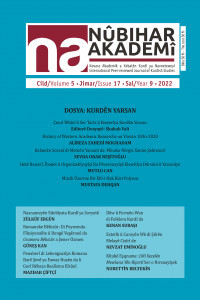The Manifestations of alienation in the novels named Ronî Mîna Evînê Tarî Mîna Mirinê, Ez ê yekî bikujim and Lêhî
The Manifestations of alienation in the novels named Ronî Mîna Evînê Tarî Mîna Mirinê, Ez ê yekî bikujim and Lêhî
Mehmed Uzun and Firat Cewerî have great efforts in the Kurdish novel. Mehmed Uzun wrote seven novels throughout his life and Firat Cewerî took his place in the history of the Kurdish novel with four novels he has written so far. Both authors went through similar processes traces of which can be seen in their novels. In the novels called Ronî Mîna Evînê Tarî Mîna Mirinê, Ez ê Yekî Bikujim û Lehî, which we will focus on, we see that the protagonists have national consciousness. They love their country, city, language and culture. The heroes took part in political works and struggled in their youth. They are physically and psychologically in good condition and handsome. In these novels, heroes who have a political identity change their political and ideological ideas over the years; they move away from their country, culture and land. They don’t want to live in that country, in those lands and among those people. Therefore, they want to get away from their community. Meanwhile, their psychology deteriorates. In other words, these novels reflect political, psychological and spatial alienation, and we want to analyze them from these aspects.
Keywords:
Mehmed Uzun, Firat Cewerî, space, alienation psychology,
___
- Fromm, E. (1982). Sağlıklı Toplum. (Y. Salman ve Z. Tanrısever. Çev.), İstanbul: Payel Yay.
- Guntrip, H. (2003). Şizoid Görüngü Nesne İlişkileri ve Kendilik. (İ. Babacan. Çev.), İstanbul: Metis Yay.
- Uzun, M. (2002). Ronî Mîna Evînê Tarî Mîna Mirinê. Stembol: Weşanên Avesta.
- Fromm, E. (1997). Özgürlük Korkusu. (R. Hakmen. Çev.), İstanbul: Güloğlu Yay.
- ISSN: 2147-883X
- Yayın Aralığı: Yılda 2 Sayı
- Başlangıç: 2014
- Yayıncı: PAK AJANS Yayıncılık
Sayıdaki Diğer Makaleler
Mulemma and Forms of Mulemma in Classical Kurdish Literature
M. Zana KARAK, Seher BİŞAROĞLU
The Comparison of Four Variants of The Zembilfirosh Epic in Terms of Four Episodes
Lexicography, Metalexicography And Bibliography of Kirmanckî (Zazakî) Dictionaries
P. î. AVERYANOV, Çevirmen: Ekrem ÖNEN
A General Perspective on the Kurdish Literature of The Period of Hakkari Principality
